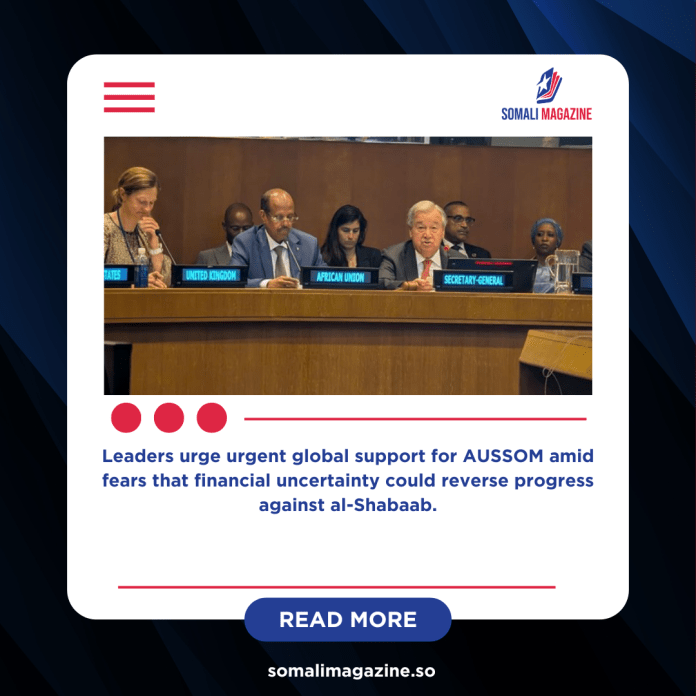Facebook Twitter (X) Instagram Somali Magazine - People's Magazine
The future of the African Union’s mission in Somalia (AUSSOM) hangs in the balance after leaders meeting in New York failed to resolve the ongoing dispute over financing. The mission, which plays a central role in Somalia’s fight against al-Shabaab militants, is facing a critical funding shortfall that threatens years of hard-won progress.
At a High-Level Event on Financing AUSSOM, held alongside the 80th UN General Assembly, AU Commission chairperson Mahmoud Ali Youssouf painted a stark picture of Somalia’s fragility. He warned that al-Shabaab continues to destabilize the country, creating a threat Somalia cannot carry alone. Youssouf emphasized that while the AU has doubled its contribution to the Peace Fund—now at $20 million—the mission still faces a staggering $180 million deficit. Without urgent, predictable, and sustainable financing, he cautioned, the achievements of recent years could be undone.
Youssouf also acknowledged what he called “funding fatigue” among traditional Western partners, many of whom have signaled hesitation about continued large-scale support. However, he stressed that AUSSOM is not designed to be an open-ended mission. With the right resources, he argued, it can help Somalia move past dependency and toward lasting stability and sovereignty. He called on the United Nations, the European Union, and other international partners to match Africa’s determination with renewed support.
Kenya’s Prime Cabinet Secretary and Foreign Affairs Minister, Musalia Mudavadi, echoed these concerns, noting that AUSSOM’s mandate is due to expire in December. He warned that the growing funding gap threatens not only the mission’s operations but also regional peace and security. Mudavadi highlighted the importance of implementing UN Security Council Resolution 2719, which outlines a hybrid financing model for AU-led peace operations through UN-assessed contributions.
According to Mudavadi, such a framework must cover troop stipends, logistics, mobility, and broader operational needs to ensure predictability. Without this, he warned, financial uncertainty undermines the mission’s readiness, emboldens extremist groups, and risks reversing progress made through years of sacrifice. Kenya currently contributes about 3,000 troops to AUSSOM, and Mudavadi affirmed that the country remains committed to the mission, standing “shoulder to shoulder” with Somalia.
Resolution 2719 is widely seen as a potential lifeline for AUSSOM, but its application remains contested. While the African Union and several UN Security Council members support its use, the United States has opposed applying it to Somalia’s mission, raising concerns about burden sharing. Mudavadi urged compromise, saying that flexibility is needed to secure a workable solution.
Somalia’s President, Hassan Sheikh Mohamud, also spoke at the meeting, stressing that AUSSOM’s success is not only a Somali priority but also essential for regional and global security. He said continued support for the mission would help secure the country’s fragile progress and safeguard broader international interests.
Despite the challenges, some new pledges of support were announced. The United Kingdom committed £16.5 million (about $22 million) to fund AUSSOM’s operations in 2025. Italy, Japan, Korea, and Spain also announced either fresh pledges or upcoming contributions. The European Union indicated that it would soon unveil specific support for the mission’s military component.
Still, with a funding gap of $180 million, the mission’s future remains deeply uncertain. Unless a compromise is reached soon, the expiration of AUSSOM’s mandate in December could leave Somalia more vulnerable to extremist attacks and risk unraveling years of collective effort.

